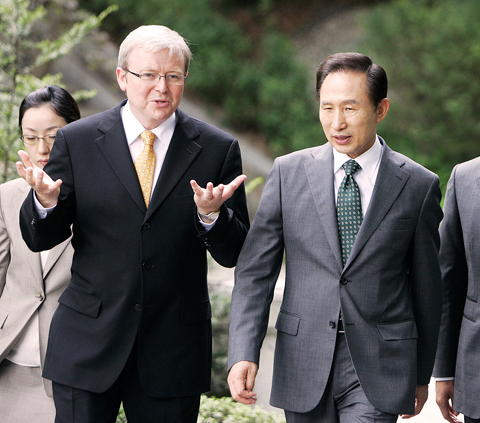South Korea said it will sell or merge 41 of the nation’s 319 state-owned companies as part of President Lee Myung-bak’s pledge to make government-run firms more competitive.
The plans include selling a 49 percent stake in Incheon International Airport Corp and part of Industrial Bank of Korea and its affiliates, the Finance Ministry said in a statement in Gwacheon yesterday.
The government also said it would merge Korea National Housing Corp and Korea Land Corp.

PHOTO: AFP
The proposal is part of Lee’s drive to introduce more efficiency into South Korean companies and spur growth in Asia’s fourth-largest economy.
The plan stops short of including the nation’s biggest state-owned energy companies, Korea Gas Corp and Korea Electric Power Corp, amid concern that selling the utilities would hurt Lee’s popularity and raise energy costs.
“In the longer term, the privatization will benefit companies and consumers,” said Kim Jae-eun, an economist at Hana Daetoo Securities Co in Seoul. “But President Lee is starting the first phase of privatization with caution, as he needs to consider the public opinion and his popularity.”
Yestereday’s announcement includes plans to sell stakes in 14 companies that are now owned by state-run financial institutions including the Korea Development Bank and Korea Asset Management Corp. Among the 14 are Woori Finance Holdings Co, Daewoo Shipbuilding & Marine Engineering Co, Ssangyong Engineering & Construction Co and Daewoo International Corp.
The government will announce further plans to sell or merge as many as many as 100 companies by early next month, Vice Finance Minister Bae Kook-hwan told reporters in Gwacheon.
South Korea also may sell a further holding in Incheon International Airport, in addition to sale of the 49 percent stake announced yesterday, Bae said.
Some government-owned companies “have low productivity and excessive wages and employee benefits,” the ministry said in the statement.
“Improving the management of the state-owned companies will ensure better-quality public services,” it said.
The ministry estimated improved efficiency will save the government about 2 trillion won (US$1.9 billion) a year.
The electricity, gas, water and medical insurance sectors were excluded from the plan “on concerns about rising charges,” it said.
South Korea on July 22 scrapped plans to sell Korea Gas and Korea Electric because of public concern that the sales would increase fees and layoffs at the utilities.
The government will boost investment in companies including Korea National Oil Corp to increase their focus on overseas natural resource projects, the ministry said. Korea Tourism Organization will sell its duty-free shop business.
Korea Real Estate Investment Trust Co, Korea Asset Investment Trust Co, Korea Construction Management Corp and New Seoul Country Club are also among the companies being sold.
The government plans to hold public hearings to discuss further details of the sales and submit a bill to the National Assembly next month.

MAKING WAVES: China’s maritime militia could become a nontraditional threat in war, clogging up shipping lanes to prevent US or Japanese intervention, a report said About 1,900 Chinese ships flying flags of convenience and fishing vessels that participated in China’s military exercises around Taiwan last month and in January last year have been listed for monitoring, Coast Guard Administration (CGA) Deputy Director-General Hsieh Ching-chin (謝慶欽) said yesterday. Following amendments to the Commercial Port Act (商港法) and the Law of Ships (船舶法) last month, the CGA can designate possible berthing areas or deny ports of call for vessels suspected of loitering around areas where undersea cables can be accessed, Oceans Affairs Council Minister Kuan Bi-ling (管碧玲) said. The list of suspected ships, originally 300, had risen to about

DAREDEVIL: Honnold said it had always been a dream of his to climb Taipei 101, while a Netflix producer said the skyscraper was ‘a real icon of this country’ US climber Alex Honnold yesterday took on Taiwan’s tallest building, becoming the first person to scale Taipei 101 without a rope, harness or safety net. Hundreds of spectators gathered at the base of the 101-story skyscraper to watch Honnold, 40, embark on his daredevil feat, which was also broadcast live on Netflix. Dressed in a red T-shirt and yellow custom-made climbing shoes, Honnold swiftly moved up the southeast face of the glass and steel building. At one point, he stepped onto a platform midway up to wave down at fans and onlookers who were taking photos. People watching from inside

Japan’s strategic alliance with the US would collapse if Tokyo were to turn away from a conflict in Taiwan, Japanese Prime Minister Sanae Takaichi said yesterday, but distanced herself from previous comments that suggested a possible military response in such an event. Takaichi expressed her latest views on a nationally broadcast TV program late on Monday, where an opposition party leader criticized her for igniting tensions with China with the earlier remarks. Ties between Japan and China have sunk to the worst level in years after Takaichi said in November that a hypothetical Chinese attack on Taiwan could bring about a Japanese

The WHO ignored early COVID-19 warnings from Taiwan, US Deputy Secretary of Health and Human Services Jim O’Neill said on Friday, as part of justification for Washington withdrawing from the global health body. US Secretary of State Marco Rubio on Thursday said that the US was pulling out of the UN agency, as it failed to fulfill its responsibilities during the COVID-19 pandemic. The WHO “ignored early COVID warnings from Taiwan in 2019 by pretending Taiwan did not exist, O’Neill wrote on X on Friday, Taiwan time. “It ignored rigorous science and promoted lockdowns.” The US will “continue international coordination on infectious